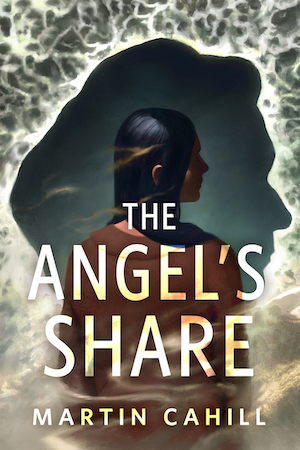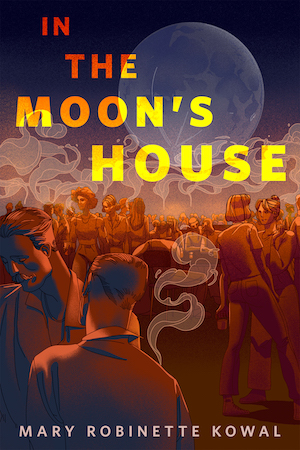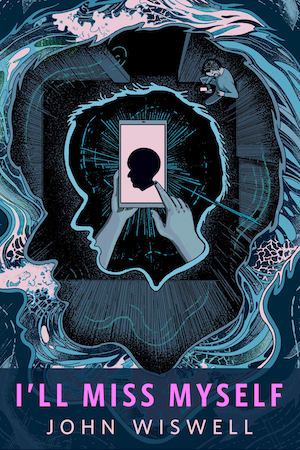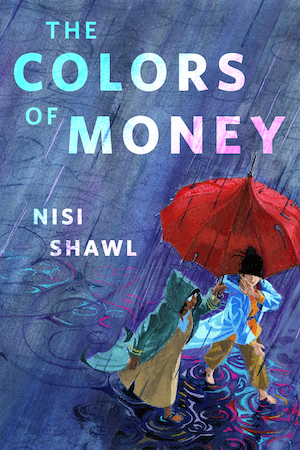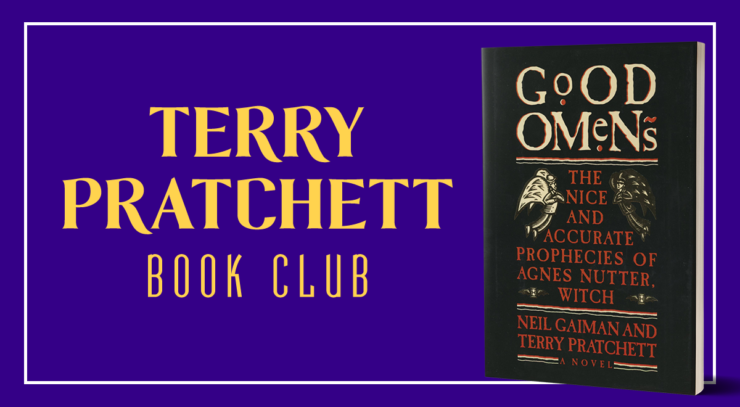Don’t go into the burning bookshop, you’ll only confuse the fireman. It’s time for part three of Good Omens!
Summary
It’s Saturday, and the delivery man has arrived at the river Uck, which used to be lovely and is now horribly polluted. Chalky is waiting there, enjoying the view. The delivery man gives him a package, which contains a silver circlet with diamonds that turns black in Chalky’s hands. The delivery man has one more delivery, with specific instructions. He leaves a note to his wife, crosses the road and is hit by a lorry. Death comes to collect him and he delivers no package, but a message to him: Come and see. Shadwell sends Newt to Tadfield after making sure he has his kit. Newt gets into his Wasabi, a car he named Dick Turpin, and sets off. On his way to Tadfield, he gets pulled over by a UFO and some aliens, who come with messages of universal peace and question the size of the Earth’s ice caps. We learn about the burning of Agnes Nutter, the only witch in England ever burned at the stake; she took the entire town with her by lining her petticoats with gunpowder and roofing nails. She was set aflame by an ancestor of Newt’s, in fact, a Witchfinder Major named Thou-Shalt-Not-Commit-Adultery Pulsifer.
Buy the Book
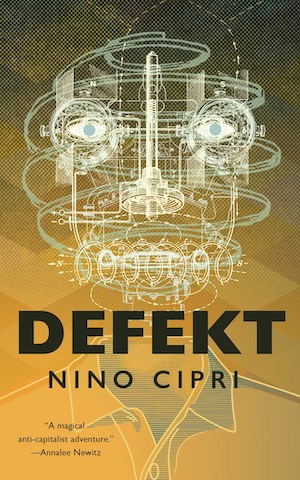

Defekt
The Them are discussing more things Adam has learned from Anathema’s magazines when Dick Turpin crashes nearby (on account of Tibetans digging a hole up from one of their tunnels beneath the surface of the Earth). They take Newt to Jasmine Cottage, where Anathema was already waiting patiently for his arrival. She explains about their ancestors, and about the book, telling Newt that the prophecies were basically her gift to her own descendants; the predictions aren’t clear as they could be, but they are completely bound up in what her family needs to know. Adam has decided that they could do much better with the world if he started the whole thing over, and tells his friends they can each have a part of it. Things begin to go even more berserk: trees growing in fast-forward and overtaking buildings; new rainforests appearing; a whaling boat getting swallowed by the kraken; a hurricane starting up in Tadfield and blowing out the windows of Jasmine Cottage. Newt doesn’t know what to do, but the prophecies indicate that he and Anathema sleep together, which he finds right distressing.
Back in London, the pin Shadwell stuck into Tadfield on his map of England gets too hot and blows right out of said map. He takes that as a sign that Newt is in terrible danger, but seeing as he has no money to travel, and no one nearby who he’s willing to borrow it from, he has only one choice—the southern pansy (Aziraphale). The flash Southern bastard (Crowley) isn’t an option because Shadwell is fairly certain he’s in the mafia and very dangerous. He goes out to have a word with the less-dangerous of his benefactors. Aziraphale, in the meantime, is dithering in his shop because he knows he should get in touch with his superiors when he really just wants to talk to Crowley. He closes up and does the ritual to get in touch with Heaven, telling the Metatron that he knows where the Antichrist is. Heaven doesn’t care much because they’re keen for the war to begin. They will win, obviously. The Metatron asks when Aziraphale will be joining them, so he insists on closing shop properly to get out of being recalled right then. He calls Crowley and gets the answering machine. Then he calls his second line and gets Crowley, but the demon is preoccupied with “an old friend.”
Before the two can have a proper conversation, Shadwell makes his presence known in Aziraphale’s bookshop, thinking that the duo have been using him for evil work. He takes out the (wrong) items to exorcise Aziraphale, while the angel tries to keep him out of the circle he used to contact Heaven because that would be fatal to the man. In the process, Aziraphale steps into the circle himself and vanishes. Shadwell believes he has done his sacred duty, banishing a demon from the earth, and leaves, knocking over a lit candle on his way out. Crowley is in his immaculate flat, panicking, when Hell calls up to ask why Warlock doesn’t seem to be the Antichrist. They tell Crowley they are sending people to pick him up so he can be punished for this mess. Crowley carefully props a bucket of Holy Water over the door to his office, which kills Ligur, but leaves Hastur to deal with. Crowley threatens him with a plant mister that he claims has more Holy Water in it, but Hastur doesn’t buy it. Crowley gets a call from Aziraphale, but the angel hangs up before he can find out what he wanted. Crowley decides to bluff Hastur, claiming that this was all a test, and he’s been selected to lead the legions of the damned in the upcoming war. Then he vanishes into the phone line and Hastur vanishes after him.
Crowley tricks Hastur by getting out of the phone lines right as his phone switches to the answering machine, trapping Hastur there. He gets into the Bentley and heads for Aziraphale’s shop. Shadwell comes back home and Madame Tracy can see that he’s in a state, so she insists that he have a lie down in her bedroom while she prepares for séance clients in the main room. Crowley arrives at the bookshop to find it ablaze. He walks in despite the presence of firefighters, finds Agnes’s book but no angel, gets back into the Bentley, and drives off.
Commentary
We finally get the proper introduction to Death in this section, and this one causes no small amount of confusion with fans because… well, to start, both Pratchett and Gaiman are known for writing popular versions of Death as a character. This one is far closer to Pratchett’s version: He speaks in all-caps; he’s got a dry sort of wit about him; he’s got those blue stars for eyes; he’s a great big skeleton with a scythe. But—and it is very important to make note of it—this is not Discworld’s Death. They are close, maybe you could even say related. Perhaps in Pratchett’s view all Deaths are like this, but they must be tied to certain places rather than the entire universe. This one obviously has to answer to a Christian-centered mythos, and it’s likely that they stuck with a version closer to Pratchett’s rendering because his Death is lifted from the Western European personification of Death as a figure. But this version is a trifle more mysterious as a figure. More unknowable.
It’s been said before in interviews that Pratchett is largely responsible for Agnes Nutter, which probably came as less of a surprise to anyone who had read the Discworld witches books before picking up Good Omens. But here, we see his grasp on some of the historical parts of witchcraft history, specifically that most of the women punished for the practice were simply village doctors who lived their lives as they pleased at a point in time when that was not generally approved. You have to imagine that giving her an end where she gets to take out the entire village for persecuting her was Pratchett’s way of imagining a little justice for all the women who fell prey to those mobs and watched their neighbors turn on them.
With the conversation between Newt and Anathema, we see the beginnings of a reckoning around the “professional descendant” concept. Newt understandably feels that spending so much time deconstructing Agnes’s prophecies (though the marginalia the book gives us to that effect is tops) prevents Anathema’s family from living their lives. There’s a practical side to this, namely the fact that we learn Agnes isn’t always the best at “remembering” the future, or interpreting what she’s remembering. But the other side to this is the book’s conversation on the subject of free will and what that means in the grand scheme of things. After all, according to Aziraphale, free will is the only game in town, and you could argue that Anathema’s family has been at least partially eschewing it for quite some time due to the book.
It’s incredibly stressful to read through Adam circling the idea of Armageddon because, if anything, it’s more relevant today than it was when it was written. Granted, the mechanism by which he’s learning about all these catastrophes is a set of conspiracy-laden magazines, but a lot of what he and the Them find themselves worrying over are genuine problems that have only grown worse in recent years—war, animal extinction, climate change, and all the rest. When Adam starts thinking that it would be better to wipe the slate and start from scratch, you have to imagine that there are far more kids his age now who would agree. None of this stuff feels so theoretical anymore, and it makes the change that comes over Adam feel more pronounced than it did the first time I read the book.
There’s a thing that I’ve thought forever, which is that Crowley is so obsessed with appearing cool and making that appearance work for him that it loops right back around into being utterly nerdy. It doesn’t mean that I love him any less, or that I don’t think he comes off cool to most people—he clearly does because lots of people are easily fooled by a good suit and sunglasses. (I keep thinking about the note from earlier that he only ever bought petrol for the Bentley once because he wanted James Bond bullet-hole-in-the-windshield decals, and are you kidding me, there is nothing actually cool in that sentence.) But it works so beautifully in his juxtaposition with Aziraphale, who clearly has opinions about what is fashionable, but also does not care a whit whether his ideas in that regard are current or shared by others. They’re both just a different stripe of nerd.
And one does the gavotte and thinks tartan is stylish, and the other has furniture and appliances that are meant to “communicate” things about him, in a flat he rarely spends any time in.
In this section, we learn how the abuses and inadequacies of Heaven and Hell have affected both Aziraphale and Crowley on a behavioral level, which is fascinating to me. The first thing the angel thinks is that he’d rather talk to Crowley than Heaven about what he’s discovered, but he ends up contacting Heaven anyway because rules are rules. He has a completely unfruitful conversation with the Metatron, has to duck his recall orders by essentially lying, and ends up trying to get in touch with Crowley anyway because he doesn’t like the answer he got from his own people. Working with Heaven has made Aziraphale evasive, depressed, and more prone to untruths than he would like to admit.
On the other side of this we have Crowley, who has been dealing with Hell. And his reaction to the treatment by his superiors comes through in two specific ways: the Holy Water and the houseplants. Crowley is so aware of what his people might do in the event of failure that he keeps an item in his home that is completely fatal to him, on the off chance that he might need to murder a coworker one day. And the houseplants are pure projection: He’s just perpetuating the abuse he gets at work onto living things he can actually control and doesn’t feel bad for frightening. The idea is couched as something comical, but when you stop to think about it, it’s downright upsetting.
And we’re just getting started, really.
Asides and little thoughts:
- Newt believes that being in the Witchfinder Army is like being in the Sealed Knot or a Civil War reenactor, because it got you out on weekends and “meant that you were keeping alive fine old traditions that had made Western civilization what it was today.” Oh, Newt. Newt, no.
- “It would be a very precise historian who could pinpoint the precise day when the Japanese changed from being fiendish automatons who copied everything from the West, to becoming skilled and cunning engineers who would leave the West standing.” Oof. Look, the less cringe version of that joke happened several years before this book came out in Back to the Future, when Marty McFly tells Doc Brown that all the best stuff is made in Japan, and this… this version is not doing that. There are a few jokes in this section like that, and they pull me right out of the book every time.
- Anathema gives a list of inventors she has studied who created things so simple and useful, people forgot they needed to be invented. But the real joke here is talking about things that are often named after the people who invented or popularized them. Things like braille, the Faraday cage, leotards, and Tupperware, and so on. Stuff that’s so commonplace that it never really occurs to you to wonder how it got that name.
- It always kind of makes me chuckle that the point when we find out Crowley’s eyes are still snake eyes is supposed to be a sort of “reveal” in the narrative. For whatever reason, it just never particularly shocked me, so the dramatics around it were always more cute than they were surprising.
Pratchettisms/Gaimanisms:
He looked like how Victorian Romantic poets looked just before the consumption and drug abuse really started to cut it.
A howling mob, reduced to utter fury by her habit of going around being intelligent and curing people, arrived at her house one April evening to find her sitting with her coat on, waiting for them.
“You do know you could find yourself charged with being a dominant species while under the influence of impulse-driven consumerism, don’t you?”
I suppose I’m meant to feel a wave of warm, tender female something-or-other about this, she thought.
It wasn’t a full-cased grandfather clock, but a wall clock with a free-swinging pendulum that E. A. Poe would cheerfully have strapped someone under.
The whole point about gangsters and cowboys and aliens and pirates was that you could stop being them and go home.
Speed it up, and the sound a tree makes is vroooom.
He ought to tell Crowley.
No, he didn’t. He wanted to tell Crowley. He ought to tell Heaven.Nothing is more reassuring, nothing is more true to the comfortable spirit of English occultism, than the smell of Brussels sprouts cooking in the next room.
Next week we will read up to “‘Right,’ he said. And he went inside.”


